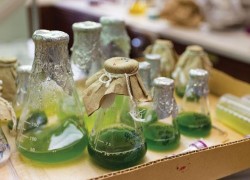
Anyone with a fish tank has probably put plenty of energy into cleaning algae out of water. Within the next decade, though, the energy in algae may be a viable source for fuel, thanks to researchers at Texas A&M U. who are developing an algae biofuel.
Algae naturally converts sunlight into an energy source during photosynthesis and can be used as a type of biofuel in two different ways. The most common way involves taking lipids, or fats, out of the algae to use as biodiesel. An alternative method creates a hydrocarbon fuel similar to gasoline or diesel. Unlike biodiesels, hydrocarbon fuel does not have oxygen and is more energy dense, which makes it a more versatile fuel source and usable in aircraft.
“The overall efficiency, rapid growth rate and yield are the major advantages of using algae,” said Joshua Yuan, assistant professor in the department of plant pathology and microbiology.
The research group aims to create methods that would generate higher yields from algae; these yields could make it possible for algae biofuel to be produced on a larger scale, then sold as an alternative to gasoline. For this to happen, the process will have to become more cost-efficient.
“For the algae to be useful as a biofuel, there are some technical barriers. For example, extracting lipids is very difficult because it is very costly,” said Shangxian Xie, plant pathology graduate student. “Right now we are developing technology to harvest the algae more cheaply by cultivating it into a pellet so you only need a filter to harvest it.”
Xie said this new method allows for a three-to-four-fold increase in yield. Innovations like this make production less expensive and more applicable to the energy market.
Another method the research group is examining involves photorespiration, an alternative to photosynthesis, where sugar is combined with oxygen. Photorespiration is not as efficient as photosynthesis and typically causes a quarter of the carbon to be lost. Yuan’s research explores ways to use this lost carbon as an energy source.
“The pathway takes the excess carbon normally lost and shunts it towards hydrocarbon synthesis. So now you have a system that just needs light, water, carbon dioxide and some minimal nutrients to produce hydrocarbons,” said Ryan Syrenne, molecular and environmental plant sciences graduate student.
Other methods currently studied by the researchers to improve algae’s use as a biofuel source involve using genes from various algae species to create a type of algae that excels in the critical areas of efficiency, growth and yield.
The possibilities of renewable energy sources like algae are also being explored by the government. In February, President Barack Obama announced his support for algae research and offered up to $14 million in grant money to assist researchers. Yuan said his research proves biofuels have the potential to become a part of the solution to the problem of depending on a non-renewable fuel source.
Currently, production of algae biofuel costs more than $20 per gallon, but that cost is slowly coming down as techniques like those explored by Yuan’s lab make it less expensive to produce large quantities.
Yuan said by the time algae biofuel becomes marketable, at around $5 per gallon in the next decade or two, it will be a much cheaper and viable option compared to gasoline that will possibly sport a double-digit price tag by then. In the meantime, Yuan and his team plan to strive for even better developments.
“My next dream is artificial photosynthesis,” Yuan said. “We are only limited by our resources.”
